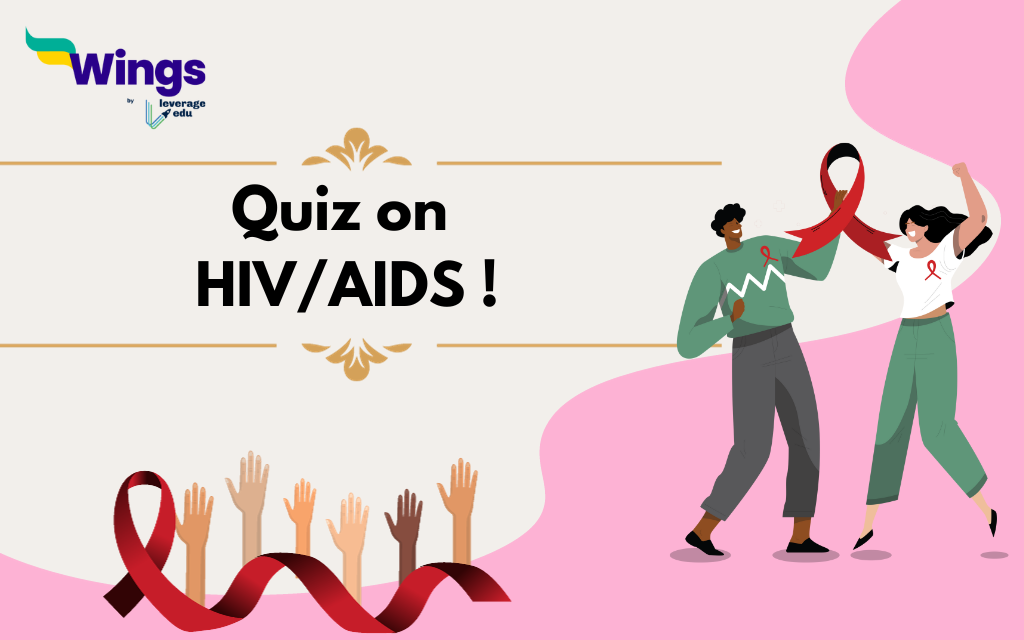As the annual celebration of World AIDS Day is gradually approaching on 1 December, it is time to participate in related activities such as a quiz on AIDS. Participating in activities and competitions like a quiz or writing an essay on AIDS can help students enhance their basic general knowledge for exams. Moreover, it can also help raise awareness about the virus, and its causes, and show support to people affected. In this blog, you will find a quiz on AIDS with answers. Make sure to read till the end to find the ultimate PDF on a quiz on AIDS with solved answers.
GK Quiz on AIDS with Answers
In this section, you will find MCQ questions and answers on AIDS. Make sure to read the question carefully and select the right answer from the given questions. Once you have attempted all the questions, use the answer key at the end to find out how many questions you have attempted correctly.
1. What does AIDS stand for?
| a) Acquired Immunodeficiency Syndrome |
| b) Acute Illness Disease Syndrome |
| c) Acute Immunodeficiency Syndrome |
2. What is the virus that causes AIDS called?
| a) Influenza Virus |
| b) Human Immunodeficiency Virus |
| c) Human Papilloma Virus |
3. How is HIV transmitted?
| a) Sharing needles or syringes |
| b) Mosquito Bites |
| c) Casual contact like shaking hands and hugging |
4. Which of the following is NOT a mode of HIV transmission?
| a) Mother-to-child transmission during childbirth or breastfeeding |
| b) Blood transfusion from an infected donor |
| c) Sharing utensils or drinking from the same cup |
5. What are the common symptoms of HIV/AIDS?
| a) chest pain, red eyes |
| b) fever, fatigue, sore throat, mouth ulcers |
| c) loss of taste, loss of smell |
6. How can HIV transmission be prevented?
| a) Getting tested and knowing your HIV status |
| b) Avoid sharing needles or syringes |
| c) both a and b |
7. Are there effective treatments for HIV/AIDS?
| a) No, there is no cure for HIV/AIDS |
| b) Treatment is only available for children |
| c) Only in advanced countries |
8. Which Region has the highest number of HIV/AIDS cases?
| a) Europe |
| b) Asia |
| c) Sub-Saharan Africa |
9. When do we celebrate World AIDS Day?
| a) 1 December |
| b) 2 December |
| c) 3 December |
10. When was HIV first recognized in the U.S.?
| a) 1979 |
| b) 1980 |
| c) 1981 |
11. What is the CD4 T-cell count at which doctors consider that a person is infected with AIDS?
| a) 200 or fewer cells per cubic millimetre |
| b) 300 or more cells per cubic millimetre |
| c) between 300 to 400 cells per cubic millimetre |
12. Why do doctors use a combination of medicines—called a cocktail— to treat HIV?
| a) Every person responds to medicines differently |
| b) Combining medicines maximise their strength |
| c) This prevents the virus from multiplying |
Answer Key
| 1. a | 5. b | 9. a |
| 2. b | 6. c | 10. c |
| 3. a | 7. a | 11. a |
| 4. c | 8. c | 12. b |
Find the Quiz on AIDS PDF Here!
FAQs
The disease that is now known as AIDS was originally called the virus human T-cell lymphotropic virus type III, or lymphadenopathy-associated virus. The USA discovered it in 1981 for the first time.
Every year December 1 is celebrated as World AIDS Day to raise awareness about the disease and support people affected by it.
AIDS is a potentially life-threatening disease caused by the HIV virus. It is not hereditary but develops after the person comes in contact with the virus.
There are many popular celebrities worldwide who have lost their lives to AIDS. Some examples are Musician Arthur Russell, Actor Anthony Perkin, and Actor Robert Reed.
Relevant Blogs
That was the Quiz on AIDS! For more information about such informative articles, check the trending events page of Leverage Edu.


 One app for all your study abroad needs
One app for all your study abroad needs












 60,000+ students trusted us with their dreams. Take the first step today!
60,000+ students trusted us with their dreams. Take the first step today!